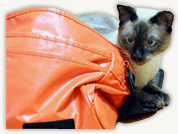Traveling with Pets

Visitors may bring their beloved pets to Korea. However, there are regulations to follow when traveling with pets. Please read carefully through this section to find out how to make traveling with pets more pleasant and enjoyable.
Entry into Korea

Commercial airlines and passenger ships have different regulations on pet transport. We strongly recommend that all visitors traveling with pets inquire their transportation service provider in advance.
Korea’s two major airlines, Korean Air and Asiana Airlines, permit pets on flights under certain conditions.
First, all pets must be kept inside a carrier during flight. Some pets may be brought into the cabin, while others may not. Guide dogs may be brought into the cabin without any size or weight restrictions.
Second, pets (cats and dogs) may be brought into the cabin if the combined weight of a pet and its carry-on carrier does not exceed 5kg (11lbs). As the carrier should be able to fit under the seat, its dimensions must not exceed 115cm (Height restrictions: 20-22cm on Korean Air; 21cm on Asiana Airlines).
Third, pets (cats and dogs) must travel in the cargo compartment if the combined weight of a pet and its carrier exceeds 5kgs (11lbs). The carrier’s dimensions must not exceed 246cm (Height restrictions: 86-88cm on Korean Air; 84cm on Asiana Airlines). Also, the combined weight of a pet and its carrier may not exceed 32kg.
Fourth, other than cats and dogs, all other animals including rabbits, hamsters, turtles, etc. must be transported in a separate cargo aircraft operated by a cargo airline.
Finally, each passenger is allowed to carry only one pet onboard. However, pets under 6 months of age may be carried in a pair (two) inside a single carrier.
Animal Quarantine
All animals are subject to inspection and quarantine at points of arrival. Visitors traveling with pets must declare their pets on the Customs Declaration Form.

Quarantine Regulations (Cats & Dogs)
Animal quarantine regulations have recently undergone a major revision. Cats and dogs entering Korea must now receive microchip implantation and rabies-neutralizing antibody tests. The revised quarantine regulations for these animals have gone into effect since December 1, 2011, and are summarized as follows:
1. Microchip Implantation and Rabies-Neutralizing Antibody Test
• A microchip must be implanted into a dog or a cat (hereinafter referred to as “animal”), and the corresponding identification number must be stated in the health certificate.
• An animal must receive a rabies-neutralizing antibody test at an internationally approved laboratory no earlier than 3 months and no later than 24 months prior to departure, and also prove that its rabies-neutralizing antibody level is at 0.5IU/ml or higher. The test results must be stated in the quarantine certificate.
☞ Animals from rabies-free zones or under 90 days old are exempt from the rule.
2. Required Documents and Number of Animals Permitted
• Required documents: Quarantine certificates (one per animal) issued by the exporting country’s authorities. The certificate must include the microchip identification number and rabies-neutralizing antibody test results.
• Maximum number of animals permitted to be imported without prior declaration: 4
3. Animal Quarantine Period
• Animals 90 days old or older
– Successful microchip implantation, and rabies-neutralizing antibody level of 0.5IU/ml or higher (as stated in the quarantine certificate) ☞ 1 day (i.e. Released on the same day)
– Failure to implant a microchip ☞ Quarantined until successful microchip implantation
– Failure to receive a rabies-neutralizing antibody test ☞ Quarantined until the antibody test is conducted, and the test results show the antibody level of 0.5IU/ml or higher
– Rabies-neutralizing antibody level lower than 0.5IU/ml ☞ Quarantined until the antibody level reaches 0.5IU/ml or higher
– Failure to implant a microchip and receive a rabies-neutralizing antibody test ☞ Quarantined until successful microchip implantation, and the antibody test is conducted, and the test results show the antibody level of 0.5IU/ml or higher
• Animals from rabies-free zones or under 90 days old
– Successful microchip implantation ☞ 1 day (i.e. Released on the same day.)
– Failure to implant a microchip ☞ Quarantined until successful microchip implantation
※ Notice: Importers of animals carrying microchips that are not international standard products (ISO 11784/11785) must prepare the appropriate microchip readers.
4. Internationally Approved Laboratories for Rabies Inspection
☞ https://ec.europa.eu/food/animal/liveanimals/pets/approval_en.htm
5. Rabies-Free Zones according to World Organisation for Animal Health (OIE)
Japan, Taiwan, Cyprus, Australia, New Zealand, Portugal, Iceland, Guam, Hawaii, Samoa, Cayman islands, French Polynesia, Martinique, Department of Reunion, Wallis and Futuna, Albania, Dominican Republic, Macedonia, Lichtenstein, Malaysia, Switzerland (As of November 5, 2010)
Airport/Seaports
Airport/Seaports Animal Quarantine Services at International Airports and Seaports
(www.gia.go.kr)
Incheon Airport: +82-32-740-2660-1
Gimhae Airport: +82-51-971-1925
Jeju Airport: +82-64-746-0761
Busan Seaport: +82-51-469-0822 Gimpo Airport: +82-2-2664-2601
Muan Airport: +82-62-975-6033
Incheon Seaport: +82-32-883-4938
Gunsan Seaport: +82-63-442-507
Airport Quarantine Stations
Incheon International Airport:
Located inside the Passenger Departure Terminal (3F), behind Counter F (Gate 7)
Gimpo International Airport:
Located inside the International Terminal (1F) – Animal Quarantine: Room 169 / Plant Quarantine: Room 171
Incheon International Airport Quarantine Office (032-740-2660~2)
Gimpo Airport Quarantine Office (02-2664-0601)
Required Documents for Birds
A quarantine certificate, issued by the exporting country’s quarantine authorities, is required when importing birds into Korea. Other documents like rabies vaccination and other health certificates are not required.
However, not all birds may be granted entry to Korea. Please check in advance the countries, from which importation of birds is permitted, as they are subject to change at any time. (Tel: +82-32-740-2660)
While in Korea

Public Transportation
Only small pets are permitted on public transportation as long as they are kept inside a pet carrier or bag at all times, and do not make other passengers feel uncomfortable.
Tourist Sites & Public Places
Tourist sites and cultural facilities have different pet regulations. While pets are not permitted at most places, they may be permitted as long as they are kept inside a pet carrier or bag at all times.
Visitors may bring their pets to most public parks, including the World Cup Stadium Park (except in the children’s playground and grass plaza), Hangang River Park, Olympic Park, and Yeouido Park. Visitors must put a collar (identification tag) on their pet, and also bring a small to properly dispose of any pet waste. Large pets must be muzzled.
Pets are not permitted at major department stores and large supermarkets. Such shopping malls as Doosan Tower or Migliore, however, allow small pets as long as they are kept inside a pet carrier or bag at all times. Pets may be permitted at convenience stores with consent. Still, it is highly recommended that pets be kept inside a pet carrier or a bag at all times.
Pet Supplies
A strip of pet stores called Cheonggyecheon Aewandongmul Sangga (청계천 애완동물상가) between Cheonggye 6-ga Intersection and Cheonggye 7-ga Intersection sell a wide range of pet supplies. The directions to the shops are as follows:
1) Dongdaemun Station (Subway Line 1, 4), Exit 7.
Walk along Cheonggyecheon Stream for 450m to arrive at the pet stores.
2) Dongmyoap Station (Subway Line 1 or 6), Exit 6.
Walk straight for 200m, and turn right at the corner of Woori Bank to arrive at the pet stores.
Pet supplies can also be found at hypermarkets and other large discount stores such as E-Mart and Homeplus.
Pet-sitting
There are various pet-sitting services across Korea. For instance, pet hotels, equipped with beds and cameras, provide a comfortable environment for pets for anywhere between 15,000 and 200,000 won. Also, veterinaries and pet beauty shops offer pet-sitting services.
